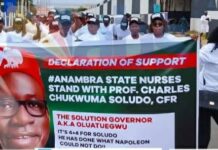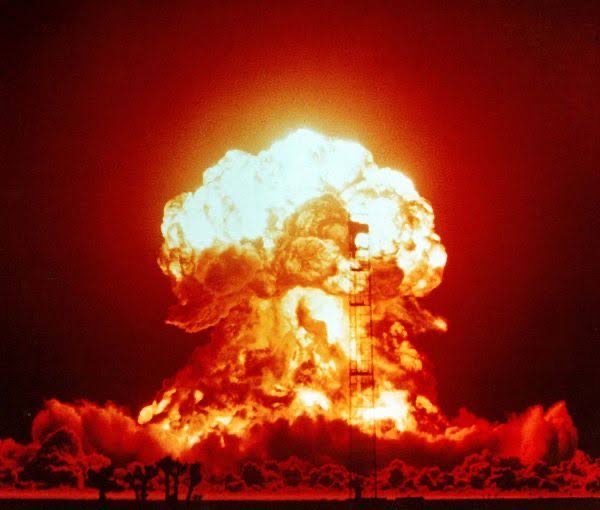China considers Taiwan part of its territory, with President Xi not ruling out using force if a diplomatic solution cannot be achieved.
Washington does not support Taiwanese independence but opposes “any unilateral changes” to the status quo from either side.
President Biden has repeatedly said that American troops would defend Taiwan if China invaded.
China’s rapid militarization and deteriorating Sino-American relations have raised fears that a conflict could erupt between the two superpowers.
Experts have warned that any conflict must remain a “war of attrition.”
Security studies expert Sam Tangredi of The U.S. Naval War College said: “Any war must be confined to the sea.
“A war of attrition has to be fought where a Chinese victory would be in peril.”
Tangredi said that elites in Beijing will be reluctant to deploy forces if there is a substantial risk of heavy losses.
He added: “As long as China thinks that’s risky, the West will be able to deter Beijing.”
But, the top naval expert warned that any conflict shouldn’t transcend the Strait of Taiwan – a 180-mile channel that separates Taiwan from continental Asia.
He said: “The West should not hit conventional targets on the Chinese mainland.
“Once that happens, the Chinese could strike Pearl Harbor or San Diego.”
Meanwhile, top geopolitical expert Brandon Weichert warned of potentially cataclysmic consequences if American forces launched an attack on a major Chinese city.
He said: “If the US targets the Chinese mainland, that’s it, really. That’s a nuclear war. That’s goodnight.”
He explained that China could respond to an attack on the mainland with nuclear weapons.
Weichert warned: “We don’t actually know how many nuclear weapons China has.
“The US estimates that they have around 500, but I believe the number of nuclear weapons is significantly larger than what is claimed.
“Missiles could pop up from underground and launch at a moment’s notice.”
And, the US has warned that Russia is helping China bolster its nuclear arsenal.
China is likely to have a stockpile of 1,500 nuclear warheads by 2035, according to the Pentagon.
Foreign policy analysts have previously told The U.S. Sun how high-tech Chinese hypersonic missiles could be used to attack US defense bases in Japan, Guam, Hawaii, and America’s West Coast.
Last month, the Defense Intelligence Agency sparked concern when it claimed China may have already developed a weapon that could hit American bases in the Pacific.
Paul Freisthler, the chief scientist for DIA’s analysis division, told a House Armed Services subcommittee that Beijing has “dramatically advanced its development of conventional and nuclear-armed hypersonic missile technologies.”
He warned that Beijing is ahead of Moscow regarding its hypersonic weapon capabilities.
If the US targets the Chinese mainland, that’s it, really.
Brandon J Weichert
But, the US has also unveiled plans for its own “carrier killer” hypersonic missile that could rival Beijing and Moscow.
Former US Marine Corps Colonel Grant Newsham (Ret.) has speculated how a war over Taiwan could develop.
In his book “When China Attacks: A Warning to America,” Newsham claimed US forces could be caught “off guard”, per Eurasian Times.
He then speculated that Chinese forces could launch attacks on West Coast ports.
Meanwhile, Weichert has warned that Beijing is already “preparing the battlefield” for a future war.
This has sparked fears that Washington is not prepared for war.
US Air Force Brigadier General Robert Spalding III (Ret.) warned that American resources have been depleted as aid has been provided to support Ukraine’s war effort.
Washington is sending around $2.6billion worth of military aid to Ukraine as Kyiv fears a “spring offensive” from Moscow.
The package includes millions of rounds of small arms ammunition and 200,000 grenades.
Funding for high-tech weapons, counter-drone rocket systems, air surveillance radar, and satellite communications will also be provided.
Spalding said: “If something does happen about Taiwan, we’re not going to have energy or resources to pursue that conflict in any meaningful way.
“We’re going to be at the beck and call of the Chinese because they’re going [to] hold over our head this ability to restrict the supply of things that we find critical to preserving life.”
The U.S. Sun reported how a conflict could lead to shortages in essential pharmaceutical products – thousands of miles from the battlefield.
Meanwhile, Taiwanese President Tsai Ing-wen is preparing to meet House Speaker Kevin McCarthy.
It comes just months after Nancy Pelosi became the first Speaker to visit Taiwan in more than 25 years.
Taipei describes the meeting in Los Angeles as a “transit” as Tsai returns to the island following a trip to Central America.
But, the Chinese consulate in LA has claimed Tsai’s trying to “put on a political show.”
Officials warned: “It is not conducive to regional peace, security nor stability, and is not in the common interests of the people of China and the United States.”
Mao Ning, the Chinese Foreign Ministry spokesperson, vowed Beijing will “resolutely defend” its sovereignty.
McCarthy has been warned that the meeting will “further damage” Sino-US relations.
And, the White House has tried to ease concerns by claiming that “transit” meetings involving Taiwanese officials are normal.
Sino-American relations deteriorated further following the Chinese spy balloon saga earlier this year.







